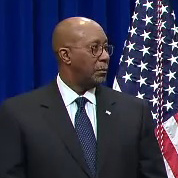 The following is an excerpt from U.S. Trade Representative Ron Kirk’s prepared remarks. The full speech is available here.
The following is an excerpt from U.S. Trade Representative Ron Kirk’s prepared remarks. The full speech is available here.
“We know that the United States and European Union can successfully and creatively address critical challenges and set high standards for global trade. For example, last year U.S. and European leaders joined like-minded countries including Australia, Canada, Japan, Korea, Mexico, Morocco, New Zealand, Singapore, and Switzerland to conclude the Anti-Counterfeiting Trade Agreement. At the time, ACTA was widely heralded as a groundbreaking achievement that will greatly improve the enforcement of intellectual property rights around the world. Since then, it has been sadly mischaracterized by some and simply misunderstood by many more.
“Frankly, we all must work to clarify how ACTA will help protect the creativity and innovation of rights holders in every country. It recognizes the fundamental relationship between innovation and the rule of law. ACTA would change the unfortunate reality that creativity and innovation are protected more often by paper rights, but police or customs authorities seldom have the power to take action when they see commercial-scale counterfeiting or piracy. We would never tolerate that standard for the theft of tangible property. Fortunately, now ACTA provides real tools to stop the wholesale robbery and theft of knowledge-based products.
“We must also do a better job of emphasizing how ACTA reflects our deep concern for the health, safety, and welfare of consumers – not only in the European Union and the United States, but around the whole world – that are compromised by counterfeit goods. At the same time, we can point out specifically that ACTA is the first and only international IP agreement to explicitly provide that enforcement of intellectual property rules on the internet must, and I’m quoting, ‘be implemented in a manner that … preserves fundamental principles such as freedom of expression, fair process, and privacy.’
“In other words, ACTA does not dictate to governments how to strike the right balance between protecting IPR and promoting these fundamental principles; but it does give us stronger tools to make those critical decisions. The truth is intellectual property theft saps the lifeblood of innovation from any market where it occurs, and counterfeit goods put the health and safety of communities and consumers at risk around the world. And since no government can single-handedly stop counterfeiting and piracy, implementing this Agreement should be an act of shared leadership.




